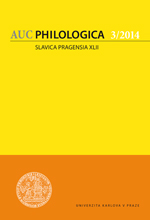Žena a stroj. Představy modernity a sexuální utopie v evropské avantgardě dvacátých let. Vybrané příklady
Woman and Machine: Concepts of Modernity and Sexual Utopia in the European Avant-garde of the 1920s. Selected Examples
Author(s): Emiliano RanocchiSubject(s): Language and Literature Studies
Published by: Univerzita Karlova v Praze, Nakladatelství Karolinum
Keywords: futurism; sexuality; machine; modernism; dystopia
Summary/Abstract: Using selected examples from early avant-garde literature, the present paper tries to show that sexuality always played an important role in the 20th century’s utopias and is inseparable from their political side. In fact, it is political in itself. The author begins by analyzing the reputation of misogyny which affected futurism at its very beginning, due to several statements of the movement’s founder, Filippo Tommaso Marinetti. However, he does not stop at the surface of these texts, but rather, tries to emphasize the other side of futuristic misogyny: by refusing to attribute to the woman her traditional role, Marinetti in fact opened the way for women’s emancipation. The futurists of the second generation distance themselves from the ideology of the founder, but continue exploring the role of women in the future world in different directions: one direction led to the past and wished mankind would come back to nature (Vasari), the other explored the possibilities inherent in gender equality, detaching sexuality from gender, thus anticipating post-human scenarios (Fillia). The paper also provides examples of how imagination about sexual life in the future world became an essential ingredient of almost all dystopian visions of the 1920s and early 1930s, and explores some links and similarities between them (ao Čapek, Sosnkowski, Zamyatin, Huxley).
Journal: Acta Universitatis Carolinae Philologica
- Issue Year: 2014
- Issue No: 3
- Page Range: 223-231
- Page Count: 9
- Language: Czech

